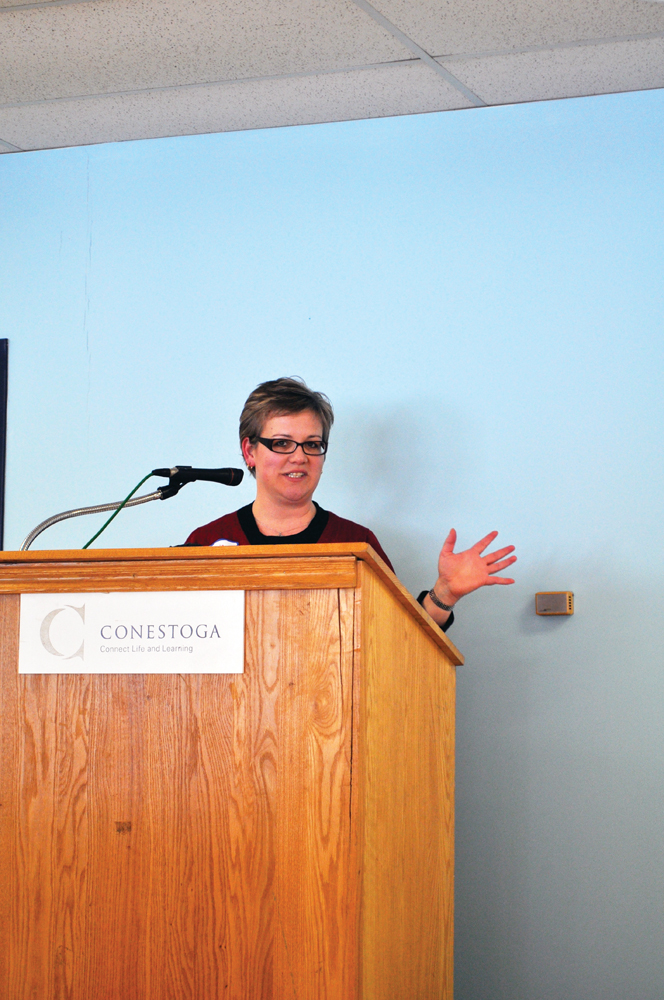

5TH ANNUAL FORUM FOR FEDERALLY SENTENCED WOMEN
Being healthy an uphill battle for women in prison and after release
Being healthy an uphill battle for women in prison and after release
Dr. Darla Fortune, from the University of Waterloo’s Department of Recreation and Leisure Studies, who has researched the role of leisure activities in the lives of people released from prison, was the keynote speaker at the 5th annual Forum for Federally Sentenced Women held January 30 at Conestoga College.
For News Tips & Advertising call...
Kitchener East - 519-578-8228
Kitchener West - 519-394-0335
 By Carrie Debrone
By Carrie DebroneKitchener Citizen
February 13, 2014
When you are in prison, staying healthy physically and mentally is tough – but it’s a challenge that must be overcome if prisoners are to be successfully integrated back into society.
The challenges were addressed by presenters at the 5th annual Forum for Federally Sentenced Women, held January 30 at Conestoga College.
Hosted by the Grand Valley Institution for Women and the students from the college’s Community and Criminal Justice Degree Program, this year’s forum theme was the role recreation, leisure and wellness activities play for women in prison and following their release back into society.
Keynote speaker Dr. Darla Fortune, from the University of Waterloo’s Department of Recreation and Leisure Studies, who has researched the role of leisure activities in the lives of people released from prison, told the 175 people who attended the forum that meaningful leisure involves freedom of choice, and is an expression of humanity helping to define who we are and who we become.
Giving an overview of how important recreation and leisure activities are, she said positive leisure experiences “allow our gifts to become visible” and often bring out people’s hidden talents.
They provide an opportunity for friendship and support, build relationships, create a sense of belonging, and can be a buffer against stress.
However, she warned that some leisure activities can become addictive, or be tied to harmful restrictive policies that stigmatize or assert social control over participants.
“Sometimes they can create stress because although people want to participate in them, they may not have the time or money to allow it.”
“For people coming out of prison they worry about the dangers of having too much free time,” Fortune said.
“I was once told by a prisoner that she didn’t want any leisure time. She said, ‘That’s when I get into trouble.’”
Fortune said the high cost of participation in leisure sports and recreation programs may limit involvement and if former prisoners apply to fee reduction programs, they often fear they will have to suffer the embarrassment of telling organizers that they were in jail.
”They have a fear of fitting in and not feeling part of the community, especially if they have just moved to a new community in order to get away from the people who they were friends with when they got into trouble,” she said.
“Leisure and recreation programs can and should play a major role in the rehabilitation of women in prison, but what does it take to make this a reality?” she asked.
Noting that not one photo of a leisure or recreational program was included in a photography project undertaken at the prison to show places or situations where the women felt most comfortable, she suggested programs could be redesigned to be more inclusive and suggested the prison offer a large number of varied programs allowing prisoners to explore their interests.
“Free time is more difficult to do than to work,” she said, adding, “ We don’t all automatically know how to make the best use of our leisure time.”
As a panel of four current and former prisoners from the Grand Valley Institution for Women in Kitchener told their personal stories, the same message emerged -- there is a lot of work to do if society wants to improve the health of prisoners.
GVI is mandated by the federal government to provide leisure and recreation programs, both for prisoners and for those who are released from prison but are still under sentencing restrictions.
Currently, GVI runs many sports and recreation programs including arts, crafts, exercise classes, sports teams, computers, book club and knitting. Most of its leisure and recreation programs are led by its hundreds of volunteers.
Anastasia Samms said she used to participate in sports before she went to prison, but found there were few sports team opportunities once inside. She said the prison does have gym equipment, but it is often difficult to book time on what little equipment there is, and that she found it difficult to “switch gears” to using fitness equipment instead of playing a team sport in order to get physical exercise.
“I became less motivated to exercise and felt there was a void in my life.”
When Samms had the opportunity to help plan a recreational sports program at GVI, she jumped on it.
She helped organize some sports teams and began to participate again.
“I felt light and refreshed. It sharpened my skills both mental and physical,” she said, but said the teams may not have happened if she wasn’t committed to creating them.
Jayde Gordon-Cummins said it is tough to get access to the prison’s seven exercise machines, explaining that access is limited to four hours a day and prisoners must sign up for a time slot.
“Some women hog the machines and people don’t want to step on their toes and create a problem between those women and themselves,” she said.
“Only about 49 of the prison’s 160 people who want on the machines every day can use them,” Gordon-Cummins said, adding that a half-hour time slot does not give enough time for a good workout. The lack of physical exercise contributes to an overweight, depressed prison community.
She said the prison used to have Zumba and Yoga programs each week, but that there are no volunteers currently willing to run them.
“One shocking quote that I’ve heard is that if the women can’t work out they will just do drugs until they do lose weight,” she said.
She said that many of the women in the prison also don’t know how to cook and so do not eat healthy food, also leading to poor health.
“Establishing healthy habits would help the women in the long run.”
Candace Pitvor, released from GVI two years ago, said the hours she spent in the gym while incarcerated helped her connect with others in a positive way and alleviated boredom and stress.
She also said that she used to walk on the prison’s track every morning, and enjoyed seeing the groundhogs in the adjoining field. Walking time allowed on the track has since been limited.
“Most people gain weight because of unhealthy eating in prison. They are vulnerable when they are released and they don’t have money for leisure activities – they don’t even have bus money,” she said.
“Not eating right, being depressed, being restricted from physical exercise can cause a downward spiral,” said Lynda Drosi, who is serving the last of a 12-year sentence.
She said it is tough to make the right choices in life but that not being healthy in mind, body and spirit just makes prison life and life after prison more of a hardship for people who already face extreme challenges.
She said that in her experience, medical staff at the prison offer pills to help women instead of finding natural ways to solve their health problems.
Noting that if women had more help to learn to become and stay healthy while they are in prison, it would benefit everyone.
“It costs $233,000 a year to keep one prisoner at GVI. A woman coming back to prison is expensive,” she said.
Local gym to offer fitness and health program for Grand Valley prisoners
by Carrie Debrone
Kitchener Citizen
February 13, 2014
Hearing the challenges to stay or become healthy faced by women in prison hit home with the founders of the local gym Xtreme Bootcamp in Kitchener, who have offered to deliver a year-long program to help Grand Valley Institution for Women inmates.
Xtreme Bootcamp Inc. founders, Sandra Leelook and Shauna Judar were two of about 175 people who attended the 5th annual Forum for Federally Sentenced Women, held January 30 at Conestoga College.
Hosted by the Grand Valley Institution for Women and the students from the college’s Community and Criminal Justice Degree Program, this year’s forum theme was the role recreation, leisure and wellness activities play for women in prison and following their release back into society.
Jessica Hutchison, Community Engagement Coordinator for the Waterloo Region Crime Prevention Council, said Leelook and Judar approached her immediately following the forum offering to help provide fitness and health programs to the women in prison.
Xtreme Bootcamp, founded in September 2010, is an athletic centre offering fitness and nutrition training, and promotes healthy living to Canadians.
“As a total health and fitness centre, XBC strives to encourage active and healthy lifestyles. We are dedicated to changing people’s lives through proper guidance in fitness and nutrition. Just like many other women in society, the women of GVI deserve the support and guidance in learning how to adjust their lifestyle so that they can live healthy and fulfilling lives,” said Xtreme Bootcamp co-owner Judar.
Xtreme Bootcamp will offer eight-week sessions focused on exercise and nutrition in the prison. The two-hour sessions will be offered once a week throughout the year.
The offer is just one example of how the community has become engaged in finding solutions to issues faced by prisoners that have been highlighted at the popular annual community forums.
Past year’s forums have focused on employment, housing, mental health, and the new minimum-security unit being constructed at the prison.
Hutchison said the employment forum has also sparked an entrepreneurship course offered through the Accelerator Centre, where business leaders in the community donate their time and expertise to teach the women in GVI how to start and run their own businesses. To date, almost 70 women have completed this program.
She said the forums were also the catalyst for many local businesses and agencies that now provide women prisoners with opportunities to work in the community during the day and return to prison at night under work releases.
The Sexual Assault Support Centre of KW also came forward offering individual counselling to women in GVI at its centre. The women travel to the centre for counselling using a temporary absence pass from the prison.
“At each forum, attendees indicate their willingness to volunteer at GVI in some capacity, either through Chaplaincy, as a driving escort or through the Stride program at Community Justice Initiatives,” said Hutchison.
Kitchener Citizen
February 13, 2014
Hearing the challenges to stay or become healthy faced by women in prison hit home with the founders of the local gym Xtreme Bootcamp in Kitchener, who have offered to deliver a year-long program to help Grand Valley Institution for Women inmates.
Xtreme Bootcamp Inc. founders, Sandra Leelook and Shauna Judar were two of about 175 people who attended the 5th annual Forum for Federally Sentenced Women, held January 30 at Conestoga College.
Hosted by the Grand Valley Institution for Women and the students from the college’s Community and Criminal Justice Degree Program, this year’s forum theme was the role recreation, leisure and wellness activities play for women in prison and following their release back into society.
Jessica Hutchison, Community Engagement Coordinator for the Waterloo Region Crime Prevention Council, said Leelook and Judar approached her immediately following the forum offering to help provide fitness and health programs to the women in prison.
Xtreme Bootcamp, founded in September 2010, is an athletic centre offering fitness and nutrition training, and promotes healthy living to Canadians.
“As a total health and fitness centre, XBC strives to encourage active and healthy lifestyles. We are dedicated to changing people’s lives through proper guidance in fitness and nutrition. Just like many other women in society, the women of GVI deserve the support and guidance in learning how to adjust their lifestyle so that they can live healthy and fulfilling lives,” said Xtreme Bootcamp co-owner Judar.
Xtreme Bootcamp will offer eight-week sessions focused on exercise and nutrition in the prison. The two-hour sessions will be offered once a week throughout the year.
The offer is just one example of how the community has become engaged in finding solutions to issues faced by prisoners that have been highlighted at the popular annual community forums.
Past year’s forums have focused on employment, housing, mental health, and the new minimum-security unit being constructed at the prison.
Hutchison said the employment forum has also sparked an entrepreneurship course offered through the Accelerator Centre, where business leaders in the community donate their time and expertise to teach the women in GVI how to start and run their own businesses. To date, almost 70 women have completed this program.
She said the forums were also the catalyst for many local businesses and agencies that now provide women prisoners with opportunities to work in the community during the day and return to prison at night under work releases.
The Sexual Assault Support Centre of KW also came forward offering individual counselling to women in GVI at its centre. The women travel to the centre for counselling using a temporary absence pass from the prison.
“At each forum, attendees indicate their willingness to volunteer at GVI in some capacity, either through Chaplaincy, as a driving escort or through the Stride program at Community Justice Initiatives,” said Hutchison.